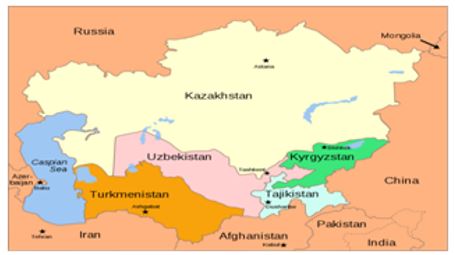

9th December 2022 (7 Topics)
Context
Addressing the first meeting of the National Security Advisors (NSAs) of India and Central Asian countries, India seeks to focus on the challenge of terrorism, the situation in Afghanistan and the importance of regional connectivity projects.
About
- The Participants:
- The NSAs of India, Kazakhstan, the Kyrgyz Republic, Tajikistan, and Uzbekistan participated in the meeting.
- Turkmenistan was represented by its ambassador in New Delhi.
- Points discussed:
- The participants called for reiterating strong support for a “peaceful, stable, and secure” Afghanistan.
- The security officials also emphasized that the territory of Afghanistan should not be used for sheltering, training, planning, or financing any terrorist acts.
- Call for collective action:
- The officials agreed that the expansion of terrorist propaganda, recruitment, and fund-raising efforts have serious security implications for the region.
- The misuse of new and emerging technologies, arms and drugs trafficking, using terrorist proxies for cross-border terrorism, abuse of cyberspace to spread disinformation and unmanned aerial systems present new challenges in counter-terrorism efforts and call for collective action.
Significance of the meet:
- This is the first time that NSAs of Kazakhstan, Kyrgyzstan, Tajikistan, and Uzbekistan are in Delhi for a high-level security meeting, which flows from the India-Central Asia virtual summit that took place in January this year.
- The meeting also strongly called for the early adoption of the UN Comprehensive Convention on International Terrorism to effectively deal with the menace.
|
Central Asia:
|
Why does Central Asia assume significance for India?
- Geostrategic location: Central Asia forms a part of India’s extended neighborhood. Its geographical proximity, strategic location, and historical linkages make it an important partner for New Delhi.
- Energy: Central Asia is significant for India as it has an abundance of oil and gas deposits.
- Global power hub: Strategically, Central Asia is emerging as the next high-stakes competition ground for global powers, hence, it would behoove India to pay closer attention.
- Significant transportation hub: Central Asia is a major transportation hub for gas and oil pipelines and multi-modal corridors connecting China, Russia, Europe, and the IOR.
Recent developments:
- India-Central Asia Dialogue: As a part of moving India’s engagement with the region forward, the first India-Central Asia Dialogue was held in Samarkand, Uzbekistan on 13 January 2019. The participants included India, the five Central Asian republics, and Afghanistan. The second India-Central Asia Dialogue was hosted virtually in October 2020.
- Connectivity Initiatives:
- TAPI Pipeline: The long-delayed Turkmenistan-Afghanistan-Pakistan-India (TAPI) pipeline, backed by the Asian Development Bank (ADB), was first proposed in the mid-1990s and all four actors officially signed an intergovernmental agreement in 2010.
- Chabahar port: The Chabahar port that was recently made partially operational gives New Delhi direct land access to CA.
- International North–South Transport Corridor (INSTC): In the last few years, India has invested in projects such as the International North–South Transport Corridor (INSTC). India sees the INSTC as an import-export route to Russia, Europe, and Central Asia.
- Engagement with the region in 2020 saw a clear focus on issues of regional economic development, connectivity, and security — apart from the immediate need of dealing with the pandemic.
- Among the highlights was the announcement of an additional 1 billion USD Line of Credit extended by India for priority development projects in energy, healthcare, connectivity, IT, agriculture, education, etc.



